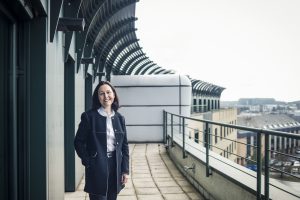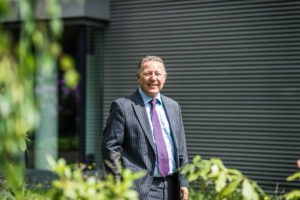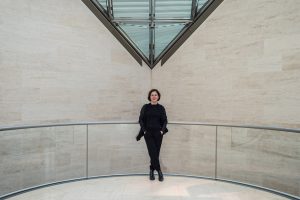The growing success of sustainable investment funds reflects an increasing awareness of climate change and its consequences. To the wider public, sustainable finance may seem a recent trend, but to Triodos Bank it has been their core activity since they were founded in 1980.
For our Financing a Sustainable Future series, LFF sat down with Justina Alders-Sheya, Fund Manager at Triodos Investment Management, the investment arm of Triodos Bank, to learn more about their impact investment philosophy and, in particular, their Luxembourg-based Sustainability Finance Real Economies fund (SFRE fund). The fund is the first of its kind established solely with private capital to finance values-based banks globally.
Triodos Investment Management was founded with the mission to make money work for positive, social, environmental and cultural change. It finances and invests only in sustainable companies, ranging from microfinance institutions to renewable energy projects. All EUR 4,9 billion in assets under management directly contribute to a more sustainable future.
What can you tell us about Triodos Investment Management, its investment thesis, and its role within sustainable finance?
Justina
Triodos Investment Management, a wholly owned subsidiary of Triodos Bank, has been investing in sustainable businesses and companies that create a positive impact for over 25 years. Themes that we focus on are energy and climate, sustainable food and agriculture as well as financial inclusion. The funds that I manage are active in the latter important category.
Statistics show that around 1.7 billion people globally are completely left out of the financial cycle, which means that they are either underserved or have no access at all to financial services.
By investing in financial inclusion, we provide access to financial services and thus access to basic needs. These basic needs include access to education, being able to save money, purchase insurance or obtaining a loan to set up a business.
We try not only to provide access to financial services but also address the challenges that people face when they are excluded from these services.
What types of companies are core to your investment pipeline and what are the selection criteria with which you evaluate them?
Justina
Two of our funds provide an excellent overview of some core aspects of our focus. Firstly, our Sustainable Finance Real Economies (SFRE) fund which predominantly invests in values-based banks. These are banks that are rooted in their community. Their products and services are designed for small and medium sized enterprises as opposed to the interbank transactions of systemic banks. Values-based banks lend more than 80% of their assets in the form of loans for financing local businesses such as bakeries, organic farmers or the local shoemakers. We see these as totally different types of financial institutions compared to mainstream banks. The banks we invest in, heavily support entrepreneurship in the real economy and their focus is on both people, planer, and profit.
The second fund is the Triodos Microfinance Fund which focuses on emerging markets areas such as Asia, Latin-America and Africa. Through this fund we invest in microfinance institutions and FinTech companies in those regions. The world is clearly digitalising, especially in emerging markets, where there is a big boost in digital services for financial inclusion.
You will also find what we call specialised financial institutions. These are companies set up to address a specific problem. Varthana is a good example of such a company, they primarily focus on financing affordable schools and education in India.

People, planet and profit – also called triple bottom line - is creating a positive impact with money by looking at not only a profit, but also including the social and environmental impact.
What is the story behind the SFRE Fund?
Justina
The SFRE fund was initiated by a network called Global Alliance for Banking on Values (GABV). The Alliance brings together 66 values-based banks worldwide, both in developed and emerging markets. The fund has an evergreen approach, thereby safeguarding its investee companies’ independence, entrepreneurship and mission.
The fund was set up because the GABV realised there is a lack of what you would call mission aligned patient capital. Banks need tier one and tier two capital to help grow and expand so that they can finance larger and more ambitious companies and projects. They found it difficult to get that kind of funding from mainstream asset managers, and this is where the SFRE fund came in. The idea was to create a vehicle that can be made available to other investors and is specifically set up to invest in and fund value-based banks across the globe.
We’ve managed the SFRE Fund since 2018 as Triodos Investment Management, and we really do believe in the idea of what this fund is trying to create: People, planet and profit – also called triple bottom line – is creating a positive impact with money by looking at not only a profit, but also including the social and environmental impact.
How long is your investment timeline and what might drive you to consider selling a position in your portfolio?
Justina
The timeline for both funds is quite long, on average seven to ten years. They are open-ended funds and don’t have an exit period. There is obviously a difference whether you are talking about an equity investment or a debt investment. Debt investments tend to have a shorter time period than an equity investment. We are long-term focused and not constrained by forced exits.
We finance these companies to make it possible for them to increase their overall chances to access other financing sources, so they can mature and develop. When considering an exit, what is most important to us is it’s a responsible one. We only sell to an investor that shares our values.

We finance these companies to make it possible for them to increase their overall chances to access other financing sources, so they can mature and develop while keeping their mission.
Can you share some “on the ground” examples of sustainable success as a result of your investments?
Justina
One of my favourite success stories from our SFRE fund is that of the Southern Bancorp, a company based in Arkansas and operating in the Mississippi Delta in the US, one of the poorest regions in the United States. Southern Bancorp provides financial education to people so that they are able to grow a credit history. With a credit history these clients are able to borrow money to start their own businesses. I visited one of these families the last time that I was in the Mississippi Delta. A family that used to live month by month through payday lenders, not able to create a credit history. They now own a hair salon and a water saving carwash business.
There seems to be this premise that emerging economies require more assistance than developed markets, however there is often a lack of mission aligned patient capital even in countries like the US. The funding gap is everywhere.
Why did you choose Luxembourg as a location to set up these two funds?
Justina
The Luxembourg regulatory framework and cross-border expertise is unique. Its credibility in the investor community allows for the funds to attract investors both from within and outside the European Union, which is important for us. The SFRE fund is a SICAV-SIF and Luxembourg was the natural choice for us.
How do you see the upcoming Sustainable Finance Disclosure Regulation impacting your fund both directly and relative to other funds?
Justina
I think it’s a positive development to start with.
A regulation that focuses on transparency when it comes to sustainability and ESG factors is needed to take out all potential ambiguities when it comes to how sustainable they really are as a fund or as a company. I think that this new regulation will make it clearer as to which funds and financial institution are really sustainable, as opposed to those that are greenwashing in some way or another.
From a Triodos perspective, the regulation will not change our strategies because our strategies have always been to create positive impact, and to be aware of the negative impact that we may be creating with our investments. I expect that it will even help us differentiate ourselves from other funds and other fund managers, but more so, I think it will bring transparency and hopefully some level of comparability between funds.
What would you suggest investors who are truly seeking to make a difference and are in the process of selecting a fund or a fund manager?
Justina
I would suggest they critically analyse the portfolios of the fund that they are selecting. Most investors do their due diligence well, but they should also look into the qualitative aspect of an asset manager and their strategic direction. The tone at the top is very important. So, not just focus and be blinded by the numbers. On a fund level, don’t just look at the fund but also at who is actually offering it. You will often see, especially with big players, that many have one or two sustainable funds. But at the same time, the majority of their funds offer products that are still negatively impacting our planet, environment and our people.
Investors could look into the labeling that a fund or asset manager has. Our Triodos Microfinance Fund, for instance, has a LuxFLAG label. I also would advise investors to look at how an asset manager assesses the sustainability criteria. We have tools that assess the more qualitative part of an organisation, the management conduct and the strategy of the organisation. We look at how impact and sustainability is really embedded in the company. We also take a close look at the quantitative part because obviously we are not a charitable organisation, we also want to create healthy returns for our investors.
How do you see the future of sustainable finance developing?
Justina
I am an optimist and it’s my sector and it’s a crucial sector. I actually think financial institutions should be partners in this development, and many are moving in this direction. I read a recent IMF report that stated that the Covid crisis has set development back 10 years.
Therefore, the need for financial institutions to get increasingly involved in development and recovery is growing every day. As we move out of Covid and look to the recovery, I think that the future of sustainable finance and of financial services is definitely bright because there is this clear need to partner together in order to reach development levels prior to Covid.
This being said, across financial services we shouldn’t continue financing companies or financing institutions that are not creating positive impact. There are choices to be made. This is a great moment for financial institutions to say: “Let’s take this moment to make the right choices when we invest.” I’m expecting that there will be much more focus on sustainable finance.
A few years ago, we saw the exclusion lists becoming mainstream. Everyone now avoids weapons or child labour for example, but we want to see more people focusing on positive screening. We really have a chance to be a force for good and especially as sustainable finance is here to stay.






